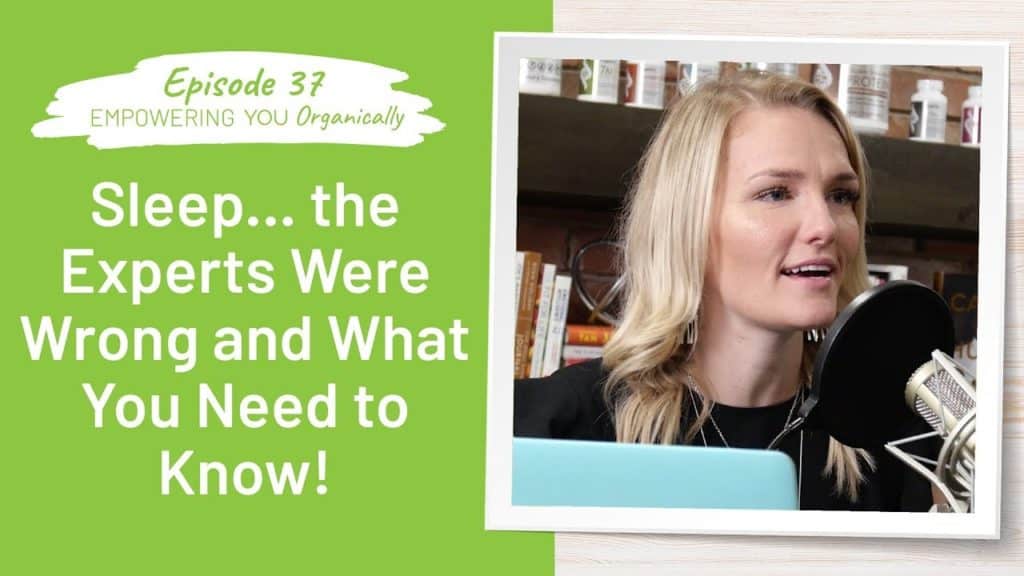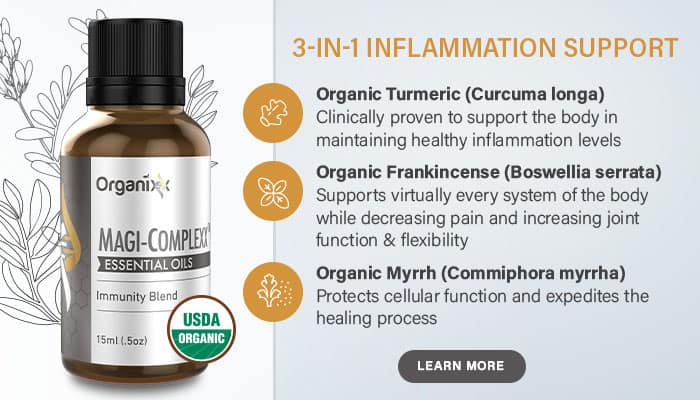Empowering you Organically – Season 6 – Episode 37
Title: Sleep… The experts were wrong and what you need to know!
Hosts: Jonathan Hunsaker & TeriAnn Trevenen
Guest: N/A
Description: Sweet slumber! Sleep is something we all do. More importantly, sleep is something we all need for vibrant health. Listen in this week as we discuss theories of sleep, stages of sleep, and the science of why we sleep. You’ll want to listen to the end! We wrap up by giving you 10 Tips for Improving Your Sleep Hygiene.
* * *
FEATURED PRODUCT
Benefits of Magnesium
-
Helps reduce stress & anxiety levels
-
Promotes restful & restorative sleep
-
Supports a healthy heart & strong bones
-
Enhances nutrient absorption & energy creation
-
Contributes to healthy cellular & nerve function
-
Helps maintain muscle mass, power & physical strength
* * *
Notes on Sleep
- Different levels of sleep are different for different people.
- It’s recommended that you get 7-8 hours of sleep a night.
- Sleep is really important physiologically, and the biologically, it’s a necessity in our body.
- You cannot get your sleep back. You cannot correct for missing sleep.
Theories on Sleep
- Inactivity Theory
- One of the earliest theories of sleep, sometimes called the adaptive or evolutionary theory.
- Suggests inactivity at night is an adaptation that served a survival function by keeping organisms out of harm’s way at times when they would be particularly vulnerable.
- Energy Conservation Theory
- Research has shown that energy metabolism is significantly reduced during sleep by as much as 10 percent in humans, and even more in other species. For example, both body temperature and caloric demand decrease during sleep, as compared to wakefulness.
- Many scientists consider this theory to be related to and part of the inactivity theory.
- Restorative Theory
- Sleep provides an opportunity for the body to repair and rejuvenate itself.
- Science shows animals deprived entirely of sleep lose all immune function and die in just a matter of weeks. This is further supported by findings that many of the major restorative functions in the body, like muscle growth, tissue repair, protein synthesis, and growth hormone release, occur mostly, or in some cases, only during sleep.
- Other rejuvenating aspects of sleep are specific to the brain and cognitive function. For example, while we are awake, neurons in the brain produce adenosine, a byproduct of the cell’s activities. The buildup of adenosine in the brain is thought to be one factor that leads to our perception of being tired. Scientists think that this buildup of adenosine during wakefulness may promote the drive to sleep. As long as we are awake, adenosine accumulates and remains high. During sleep, the body has a chance to clear adenosine from the system, and as a result, we feel more alert when we’re awake.
- Brain Plasticity Theory
- One of the most recent and compelling explanations for why we sleep is based on findings that sleep is correlated to changes in the structure and organization of the brain. This phenomenon, known as brain plasticity, is not entirely understood, but its connection to sleep has several critical implications.
- It’s becoming clear, for example, that sleep plays a critical role in brain development in infants and young children. Infants spend about 13-14 hours per day sleeping, and about half of that time is spent in REM sleep, the stage in which most dreams occur.
- A link between sleep and brain plasticity is becoming clear in adults as well. This is seen in the effect that sleep and sleep deprivation have on people’s ability to learn and perform a variety of tasks.
Stages of Sleep
- Stage 1 – Non-REM sleep.
- The changeover from wakefulness to sleep. During this short period of relatively light sleep, your heartbeat, breathing, and eye movements slow, and your muscles relax, with occasional twitches.
- Stage 2 – Non-REM sleep.
- A period of light sleep before you enter deep sleep. Your heartbeat and breathing slow, and muscles relax even further. Your body temperature drops, and eye movement stops.
- Stage 3 – Non-REM sleep.
- The period of deep sleep that you need to feel refreshed in the morning. It occurs in longer periods during the first half of the night. Your heartbeat and breathing slow to their lowest levels during sleep. Your muscles are relaxed, and it may be difficult to awaken.
- REM Sleep
- First occurs about 90 minutes after falling asleep. Your eyes move more rapidly, mixed-frequency brainwave activity becomes closer to that seen in wakefulness, your breathing becomes faster and irregular, and your heart rate and blood pressure increase to near waking levels.
- Most of your dreaming occurs during REM sleep, although some can also occur in non-REM sleep. As you age, you sleep less of your time in REM sleep.
Why We Sleep
Matthew Walker, an expert in sleep at UC Berkley, and author of the bestselling book, Why We Sleep, said, “The decimation of sleep throughout industrialized nations is having a catastrophic impact on our health, our wellness, even the safety and education of our children. It’s a silent sleep loss epidemic. It’s fast becoming one of the greatest challenges we face in the 21stCentury.”
- “It makes you dumber.” Cognitive function.
- More forgetful. Unable to learn new things.
- More vulnerable to dementia.
- More likely to die of a heart attack.
- Less able to fend off sickness with a strong immune system.
- More likely to get cancer.
- Makes your body literally hurt more.
- Lack of sleep distorts your genes and increases your risk of death generally, disrupts the creation of sex hormones, like estrogen and testosterone, and leads to premature aging.
10 Tips for Improving Your Sleep Hygiene
- Try to keep the same sleep schedule on weeknights and weekends. Limit the difference to no more than about an hour. Staying up late and sleeping in late on weekends can disrupt your body’s clock and sleep-wake rhythm, which is going to impact your pattern of being able to fall asleep. For children, have a set bedtime and a bedtime routine. Don’t use the child’s bedroom for time-outs of punishments.
- Create a quiet, comfortable sleep environment. Set your bedroom thermostat at a comfortable temperature, turn off the TV and other things that may disrupt sleep. If your pet wakes you up, keep them outside the bedroom. Your bedroom should be dark. Turn off bright lights and have a comfortable mattress.
- Essentia mattress
- Light-blocking film
- White noise machine
- Keeping your room cool
- An hour before bedtime, dim the lights and turn off all screens.
- Turn off blue light sources.
- If you can’t sleep, get out of bed and do something quiet and relaxing until the urge to sleep returns. Then, go back to bed.
- Never go to bed tipsy.
- Alcohol is a sedative, and sedation is not sleep. It also blocks your REM dream sleep, an important part of the sleep cycle. Your heart rate doesn’t get low enough, so you’re not getting that restorative sleep, you’re not able to really slow things down.
- Avoid heavy and/or large meals within a couple hours of bedtime. Having a light snack is okay.
- Avoid nicotine and caffeine. Nicotine and caffeine are stimulants, and both substances can interfere with sleep. The effects of caffeine can last as long as eight hours.
- Spend time outside every day when possible. Be physically active. Exercise before 2:00 pm every day. Exercise promotes continuous sleep. Avoid rigorous exercise before bedtime. Rigorous exercise circulates endorphins into the body, which may cause difficulty initiating sleep.
- If you’re a clock watcher, remove it from the line of sight.
- Have a comfortable pre-bedtime routine.
- Warm bath
- Meditation
- Quiet time
- Reading
- Connected to #4 – Stay in bed and focus on your breathing for a little while before you get up out of bed.
Naps
- Napping during the day may provide a boost in alertness and performance. However, if you have trouble falling asleep at night, limit naps or take them earlier in the afternoon. Adults should nap for no more than 20 minutes. Napping in preschool-age children is normal and promotes healthy growth and development.
- It’s the 20-minute power nap that really rejuvenates you the most and has you wake up and being alert, whereas the 30-40-minute nap can almost get you into that deep sleep again, and then you wake up out of that and you’re more groggy, and your body’s confused. It’s not sure if it should be going into deep sleep or not.
* * *
Subscribe to Empowering You Organically
Never miss an episode!
APPLE PODCASTS SPOTIFY GOOGLE PODCASTS
–
Episode 37 – Sleep… The experts were wrong and what you need to know!






